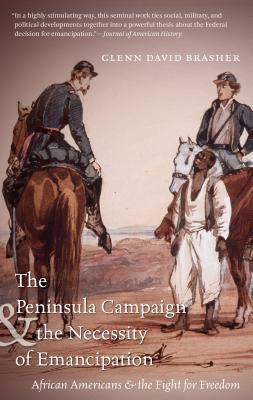
- Afhalen na 1 uur in een winkel met voorraad
- Gratis thuislevering in België vanaf € 30
- Ruim aanbod met 7 miljoen producten
- Afhalen na 1 uur in een winkel met voorraad
- Gratis thuislevering in België vanaf € 30
- Ruim aanbod met 7 miljoen producten
Zoeken
The Peninsula Campaign & the Necessity of Emancipation
African Americans & the Fight for Freedom
Glenn David Brasher
€ 49,95
+ 99 punten
Omschrijving
In the Peninsula Campaign of spring 1862, Union general George B. McClellan failed in his plan to capture the Confederate capital and bring a quick end to the conflict. But the campaign saw something new in the war -- the participation of African Americans in ways that were critical to the Union offensive. Ultimately, that participation influenced Lincoln's decision to issue the Emancipation Proclamation at the end of that year. Glenn David Brasher's unique narrative history delves into African American involvement in this pivotal military event, demonstrating that blacks contributed essential manpower and provided intelligence that shaped the campaign's military tactics and strategy and that their activities helped to convince many Northerners that emancipation was a military necessity.
Drawing on the voices of Northern soldiers, civilians, politicians, and abolitionists as well as Southern soldiers, slaveholders, and the enslaved, Brasher focuses on the slaves themselves, whose actions showed that they understood from the outset that the war was about their freedom. As Brasher convincingly shows, the Peninsula Campaign was more important in affecting the decision for emancipation than the Battle of Antietam.
Drawing on the voices of Northern soldiers, civilians, politicians, and abolitionists as well as Southern soldiers, slaveholders, and the enslaved, Brasher focuses on the slaves themselves, whose actions showed that they understood from the outset that the war was about their freedom. As Brasher convincingly shows, the Peninsula Campaign was more important in affecting the decision for emancipation than the Battle of Antietam.
Specificaties
Betrokkenen
- Auteur(s):
- Uitgeverij:
Inhoud
- Aantal bladzijden:
- 296
- Taal:
- Engels
- Reeks:
Eigenschappen
- Productcode (EAN):
- 9781469617503
- Verschijningsdatum:
- 1/08/2014
- Uitvoering:
- Paperback
- Formaat:
- Trade paperback (VS)
- Afmetingen:
- 146 mm x 229 mm
- Gewicht:
- 399 g

Alleen bij Standaard Boekhandel
+ 99 punten op je klantenkaart van Standaard Boekhandel
Beoordelingen
We publiceren alleen reviews die voldoen aan de voorwaarden voor reviews. Bekijk onze voorwaarden voor reviews.











